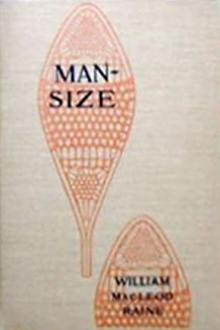Laughing Bill Hyde and Other Stories by Rex Beach (ebook smartphone .TXT) 📗

- Author: Rex Beach
Book online «Laughing Bill Hyde and Other Stories by Rex Beach (ebook smartphone .TXT) 📗». Author Rex Beach
After the arrival of the head "clarks" and stenographers at nine-forty-five, there ensued fifteen minutes of guarded conversation in front of the offices. During this time the public issues of the day were settled and the nation's policies outlined. At ten o'clock the offices were formally opened, and at ten-thirty a reception was tendered to the managers who arrived dressed as for any well-conducted afternoon function.
To Mitchell, who was accustomed to the feverish, football methods of American business life, all this was vastly edifying and instructive; it was even soothing, although he was vaguely offended to note that passers-by avoided him as if fearful of contamination.
Upon entering 42-1/2 Threadneedle Street, he was halted by an imperious office-boy. To him Louis gave his card with a request that it be handed to Mr. Peebleby, then he seated himself and for an hour witnessed a parade of unsmiling, silk-hatted gentlemen pass in and out of Mr. Peebleby's office. Growing impatient, at length, he inquired of the boy;
"Is somebody dead around here or is this where the City Council meets?"
"I beg pardon?" The lad was polite in a cool, superior way.
"I say, what's the idea of the pall-bearers?"
The youth's expression froze to one of disapproval and suspicion.
"I mean the parade. Are these fellows Congress- or minstrel-men?"
His hearer shrugged and smiled vacuously, then turned away, whereupon
Mitchell took him firmly by the arm.
"Look here, my boy," he began. "There seems to be a lot of information coming to both of us. Who are these over-dressed gentlemen I see promenading back and forth?"
"Why—they're callers, customers, representatives of the firms we do business with, sir."
"Is this Guy Fawkes Day?"
"No, sir."
"Are these men here on business? Are any of them salesmen, for instance?"
"Yes, sir; some of them. Certainly, sir."
"To see Mr. Peebleby about the new construction work?"
"No doubt."
"So, you're letting them get the edge on me."
"I beg pardon?"
"Never mind, I merely wanted to assure you that I have some olive spats, a high hat, and a walking-stick, but I left them at my hotel. I'm a salesman, too. Now then let's get down to business. I've come all the way from America to hire an office-boy. I've heard so much about English office-boys that I thought I'd run over and get one. Would you entertain a proposition to go back to America and become my partner?"
The boy rolled his eyes; it was plain that he was seriously alarmed.
"You are ragging me, sir," he stammered, uncertainly.
"Perish the thought!"
"I—I—Really, sir—"
"I pay twenty-five dollars a week to office-boys. That's five 'pun' in your money, I believe. But, meanwhile, now that I'm in London, I have some business with Mr. Peebleby." Mitchell produced an American silver dollar and forced it into the boy's hand, whereupon the latter blinked in a dazed manner, then hazarded the opinion that Mr. Peebleby might be at leisure if Mr. Mitchell had another card.
"Never mind the card; I can't trust you with another one. Just show me the trail and I'll take it myself. That's a way we have in America."
A moment later he was knocking at a door emblazoned, "Director General." Without awaiting an invitation, he turned the knob and walked in. Before the astonished Mr. Peebleby could expostulate he had introduced himself and was making known his mission.
Fortunately for Mitchell, Englishmen are not without a sense of humor. The announcement that this young man had come all the way from Chicago, Illinois, U.S.A., to bid on the Krugersdorpf work struck Mr. Peebleby as amusing. Not only was the idea in itself laughable, but also the fact that a mere beardless youth should venture to figure on a contract of such gigantic proportions quite convulsed the Director General, and in consequence he smiled. Then fearing that his dignity had been jeopardized, he announced politely but firmly that the proposition was absurd, and that he had no time to discuss it.
"I've come for that job, and I'm going to take it back with me," Mitchell averred, with equal firmness. "I know more about this class of work than any salesman you have over here, and I'm going to build you the finest cluster of cyanide tanks you ever saw."
"May I ask where you obtained this comprehensive knowledge of tank construction?" Mr. Peebleby inquired, with some curiosity.
"Sure!" Mitchell ran through a list of jobs with which the Director General could not have been unfamiliar. He mentioned work that caused that gentleman to regard him more respectfully. For a time questions and answers shot back and forth between them.
"I tell you, that is my line," Mitchell declared, at length. "I'll read any blueprints you can offer. I'll answer any queries you can formulate. I'm the accredited representative of a big concern, and I'm entitled to a chance to figure, at least. That courtesy is due me."
"I dare say it is," the other reluctantly agreed. "I'm very busy, but if that is the quickest way to end the discussion I'll give you the prints. I assure you, nevertheless, it is an utter waste of your time and mine." He pushed a button and five minutes later a clerk staggered back into the room with an armful of blueprints that caused Mitchell to gasp.
"The bid must be in Thursday at ten-thirty," Peebleby announced.
"Thursday? Why, good Lord! That's only three days, and there's a dray-load of drawings!"
"I told you it was a waste of time. You should have come sooner."
Mitchell ran through the pile and his heart grew sick with dismay. There were drawings of tanks, drawings of substructures and superstructures in every phase of construction—enough of them to daunt a skilled engineer. He realized that he had by no means appreciated the full magnitude of this work, in fact had never figured on a job anything like this one. He could see at least a week's hard, constant labor ahead of him—a week's work to be done in three days. There was no use trying; the time was too short; it was a physical impossibility to formulate an intelligent proposition in such a short length of time. Then to Mitchell's mind came the picture of a wretched, golden-haired girl clinging to the iron fence of the Pennsylvania depot. He gathered the rolls into his arms.
"At ten-thirty, Thursday," said he.
"Ten-thirty, sharp."
"Thank you. I'll have my bid in."
His muscles ached and his knees were trembling even before he had reached the street. When he tried to board a 'bus he was waved away, so he called a cab, piled his blueprints inside of it, and then clambered in on top of them. He realized that he was badly frightened.
To this day the sight of a blueprint gives Louis Mitchell a peculiar nausea and a fluttering sensation about the heart. At three o'clock the next morning he felt his way blindly to his bed and toppled upon it, falling straightway into a slumber during which he passed through monotonous, maddening wastes of blue and white, over which ran serpentine rows of figures.
He was up with the dawn and at his desk again, but by four that afternoon he was too dazed, too exhausted to continue. His eyes were playing him tricks, the room was whirling, his hand was shaking until his fingers staggered drunkenly across the sheets of paper. Ground plans, substructures, superstructures, were jumbled into a frightful tangle. He wanted to yell. Instead he flung the drawings about the room, stamped savagely upon them, then rushed down-stairs and devoured a table d'hôte dinner. He washed the meal down with a bottle of red wine, smoked a long cigar, then undressed and went to bed amid the scattered blueprints. He slept like a dead man.
He arose at sun-up, clear-headed, calm. All day he worked like a machine, increasing his speed as the hours flew. He took good care to eat and drink, and, above all, to smoke at regular intervals, but he did not leave his room. By dark he had much of the task behind him; by midnight he began to have hope; toward dawn he saw the end; and when daylight came he collapsed.
He had deciphered the tank and superstructure plans on forty-five sets of blueprints, had formulated a proposition, exclusive of substructure work, basing a price per pound on the American market then ruling, f.o.b. tidewater, New York. He had the proposition in his pocket when he tapped on the ground-glass door of Mr. Peebleby's office at ten-twenty-nine Thursday morning.
The Director General of the great Robinson-Ray Syndicate was genuinely surprised to learn that the young American had completed a bid in so short a time, then requested him, somewhat absent-mindedly, to leave it on his desk where he could look it over at his leisure.
"Just a moment," said his caller. "I'm going to sit down and talk to you again. How long have you been using cyanide tanks, Mr. Peebleby?"
"Ever since they were adopted." Mr. Peebleby was visibly annoyed at this interruption to his morning's work.
"Well, I can give you a lot of information about them."
The Director General raised his brows haughtily. "Ah! Suggestions, amendments, improvements, no doubt."
"Exactly."
"In all my experience I never sent out a blueprint which some youthful salesman could not improve upon. Generally the younger the salesman the greater the improvement."
In Mitchell's own parlance he "beat Mr. Peebleby to the punch." "If that's the case, you've got a rotten line of engineers," he frankly announced.
"Indeed! I went over those drawings myself. I flattered myself that they were comprehensive and up-to-date." Mr. Peebleby was annoyed, nevertheless he was visibly interested and curious.
"Well, they're not," the younger man declared, eying him boldly. "For instance, you call for cast-iron columns in your sub-and super-structures, whereas they're obsolete. We've discarded them. What you save in first cost you eat up, twice over, in freight. Not only that, but their strength is a matter of theory, not of fact. Then, too, in your structural-steel sections your factor of safety is wrongly figured. To get the best results your lower tanks are twenty inches too short and your upper ones nine inches too short. For another thing, you're using a section of beam which is five per cent. heavier than your other dimensions call for."
The Director General sat back in his chair, a look of extreme alertness replacing his former expression.
"My word! Is there anything else?" He undertook to speak mockingly, but without complete success.
"There is. The layout of your platework is all wrong—out of line with modern practice. You should have interchangeable parts in every tank. The floor of your lower section should be convex, instead of flat, to get the run-off. You see, sir, this is my line of business."
"Who is your engineer?" inquired the elder man. "I should like to talk to him."
"You're talking to him now. I'm him—it—them. I'm the party! I told you I knew the game."
There was a brief silence, then Mr. Peebleby inquired, "By the way, who helped you figure those prints?"
"Nobody."
"You did that alone, since Monday morning?" The speaker was incredulous.
"I did. I haven't slept much. I'm pretty tired."
There was a new note in Mr. Peebleby's voice when he said: "Jove! I've treated you badly, Mr. Mitchell, but—I wonder if you're too tired to tell my engineers what you told me just now? I should like them to hear you."
"Trot them in." For the first time since leaving this office three days before, Mitchell smiled. He was getting into his stride at last. After all, there seemed to be a chance.
There followed a convention of the draftsmen and engineers of the
Robinson-Ray Syndicate before which an unknown American youth
delivered an address on "Cyanide Tanks. How to Build Them; Where to
Buy Them."
It was the old story of a man who had learned his work thoroughly and who loved it. Mitchell typified the theory of specialization; what he knew, he knew completely, and before he had more than begun his talk these men recognized that fact. When he had finished, Mr. Peebleby announced that the bids would not be opened that day.
The American had made his first point. He had gained time in which to handle himself, and the Robinson-Ray people had recognized a new factor in the field. When he was again in the Director General's room, the latter said:
"I think I will have you formulate a new bid along the lines you have laid down."
"Very well."





Comments (0)